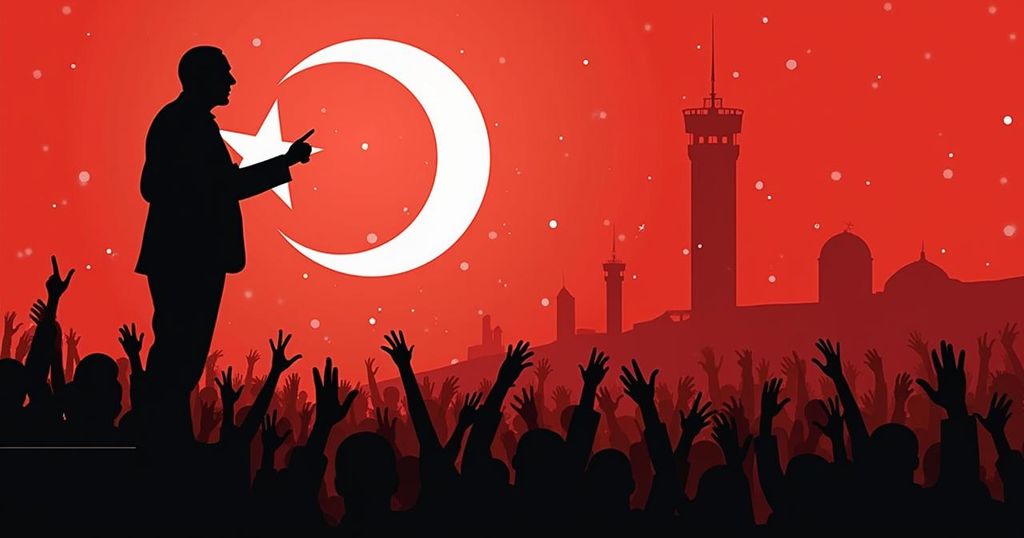Kais Saied’s Re-Election Bid: A Predetermined Outcome Amidst Rising Authoritarianism in Tunisia

President Kais Saied of Tunisia is running for re-election in an election that many view as predetermined in his favor. His main competitor, Ayachi Zammel, is currently imprisoned, raising concerns about the fairness of the election process. The election reflects a significant erosion of democratic norms in Tunisia as President Saied has centralized power and dismantled previous democratic gains since his election in 2019. Many opposition figures have been arrested, and public engagement in the electoral process appears minimal, significantly impacting voter turnout expectations.
Tunisia’s President Kais Saied is seeking re-election as he prepares for an election viewed as largely predictable, with expectations favoring his victory. Despite initial hopes from over ten politicians to challenge him, only two candidates were approved by the electoral commission. Notably, one of these candidates, Ayachi Zammel, was sentenced to twelve years in prison just five days prior to the election for document forgery, raising serious questions about the fairness of the electoral process. Since President Saied’s election in 2019, he has garnered both staunch support and substantial criticism. His presidency began with a promise of renewal and restoration following the Arab Spring, yet his tenure has been marked by significant political repression. The president has dissolved parliament, rewritten the constitution, and accumulated extensive power, with experts asserting that he has essentially eliminated democratic competition. Sarah Yerkes from the Carnegie Endowment for International Peace remarked that the electoral situation has been manipulated to the extent that “there is no contest – he is the only viable candidate.” There has also been an alarming trend of detaining prominent figures associated with the opposition, including senior members of the Ennahda party, casting a shadow over the integrity of the elections. Human Rights Watch noted that there have been various efforts to exclude potential candidates through legal reprisals. The atmosphere surrounding this election is profoundly discouraging for many, with an absence of public campaign activities noted. Instead, support for President Saied dominates the public consciousness through extensive poster campaigns, reminiscent of an electoral environment devoid of genuine political engagement. Saied’s rhetoric has been reportedly populist, at times scapegoating migrants for the nation’s economic woes, which has led to various social repercussions, including a rise in xenophobic attitudes. Despite this, the president’s actions have not translated into substantial improvements within Tunisia’s ailing economy, which faces persisting high unemployment rates and a youth exodus.
The upcoming election marks Tunisia’s third presidential race since the ousting of long-standing dictator Zine al-Abidine Ben Ali during the Arab Spring—a pivotal moment in 2011 that signaled potential democratic growth within the country. Initially viewed with optimism, President Kais Saied’s governance has increasingly diverged from democratic ideals as he has amassed power and curtailed civil liberties. Following a period of hope, particularly regarding economic reform and the mitigation of corruption, his actions in 2021, characterized by a self-coup, have led to significant democratic backsliding, as highlighted by Tunisia’s drop in global democracy rankings. This context is essential for understanding the current electoral landscape where opposition voices are stifled and the electoral commission’s role has come under scrutiny.
In summary, the electoral environment in Tunisia serves as a stark reflection of President Kais Saied’s consolidation of authority and the broader implications for the country’s democratic trajectory. The dynamics leading to this election highlight significant challenges, including the blatant suppression of opposition and the absence of legitimate competition. As Tunisia stands at a critical juncture, the outcomes of these elections may very well determine the future of democratic governance and civil rights in the nation.
Original Source: www.bbc.com








